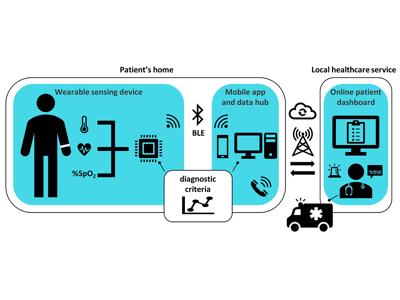In serious cases of COVID-19, the deterioration of the clinical conditions of the patient occurs within a few hours and can lead to acute respiratory distress syndrome (ARDS), which requires the use of mechanical ventilation. Timely intervention is essential to predict/detect the onset of ARDS. The indicator used in clinical practice to evaluate the prognosis in patients with suspect ARDS symptoms and to determine whether the patient needs mechanical ventilation is based on the invasive assessment of the ratio of arterial oxygen partial pressure (PaO2 in mmHg) to fractional inspired oxygen (FiO2 expressed as a fraction), also known as P/F ratio.
The open source CovAid monitoring system, currently under development, is based on a wireless all-in-one smartband, designed for real-time non-invasive measurement and recording of patient vital parameters such as temperature, heart rate, and blood oxygen saturation (SpO2), and for obtaining automatically the P/F ratio value. This device, based on non-invasive sensors, can be connected wireless to a data hub (smartphone and/or computer with dedicated app) for local and remote systematic monitoring of the patient vital parameters over time. The CovAid system, designed to be easy-to-use and low cost, will be equipped with alarms that will activate in case of measurement of under- or over-threshold values, allowing the patients isolated at home to warn the health emergency services as soon as the first symptoms of respiratory deterioration occur.
Made available to patients isolated at home and to nursing homes, characterized by a large number of people potentially at risk, this system will enable systematic monitoring of the vital parameters of patients affected by respiratory diseases (e.g. bronchial asthma, acute airway infections) or by COVID-19 or suspected of being affected by this pathology. Such a systematic monitoring will be crucial for supporting family doctors in making decisions in case of emergency/respiratory crisis and for providing essential preliminary information to First Aid Health Workers, ultimately for promptly detecting and treating the onset of ARDS. CovAid monitoring system will provide support for the emergency management and will have a significant impact in terms of emergency actions and economic consequences for National Health Systems.

Approved by mentor
Medical tags
- Clinical need
- Monitoring purpose
- Area
- Public health
- Technology
- Monitoring device
- Project keywords
- Wearable wireless monitoring, ARDS, COVID-19, Decision-making, Prognosis, Prediction, First Aid
- Device classification
- IIa